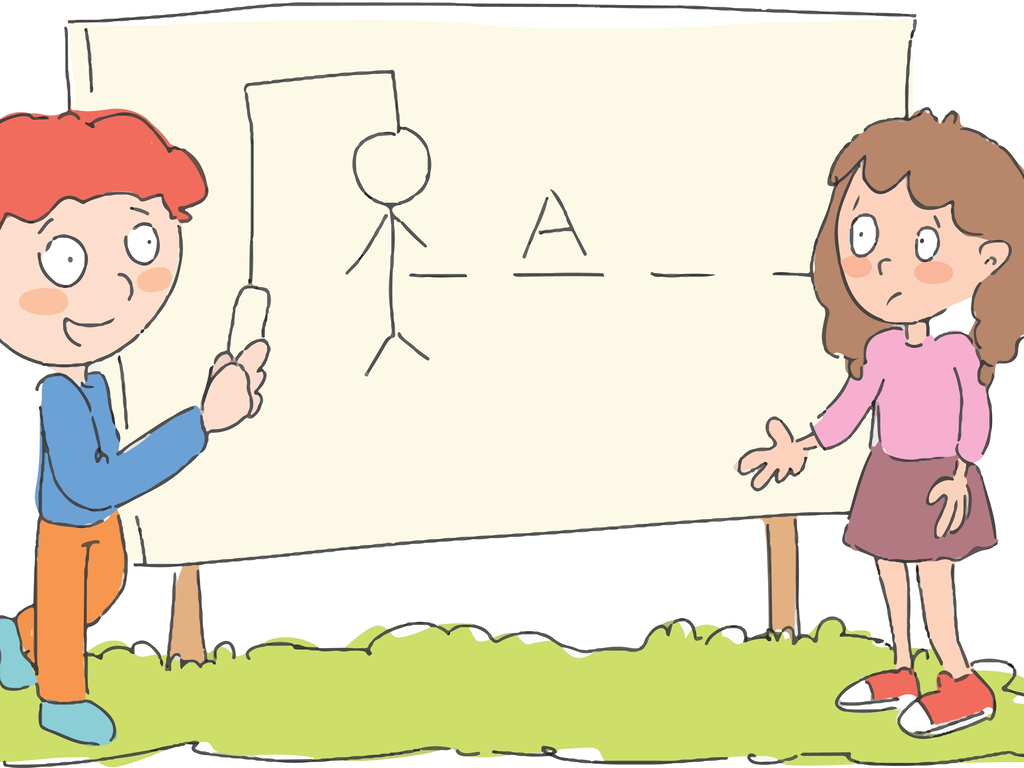Last Updated on January 7, 2024 by Gamesver Team and JC Franco

Hangman is a simple word game that, as far as the records show, dates back many centuries ago. Today, it is mostly used as a fun learning tool for children to broaden their vocabulary and help them get a grasp on a new language.
The main reason for Hangman’s popularity is likely its simplicity. All you really need is a blackboard and some chalk, or some pen and paper. It doesn’t require purchasing any specialized materials and tools or crafting capability.
When it comes to learning vocabulary, new students need to learn the exact pronunciation and spelling of words they already know. Teachers need to make sure both aspects are equally and adequately represented to the students. There is no doubt that Hangman is fun and can be a valuable tool for students, but it’s important to note the disadvantages of the game.
While the game of Hangman has some important advantages to consider, such as: making learning vocabulary fun, being adaptable for people of all ages and useful in a variety of settings, being more interactive than many other word games, and being a useful tool for learning and revising learned words; it is not without faults.
In this article, we have selected and elaborated on several disadvantages of playing Hangman. If you want to delve into each of the disadvantages, read on.
These are 12 disadvantages and downsides of playing Hangman:
1. Frustration
Failing to get the correct answer, especially if it happens for several games in a row, can cause distress in students. This may distract from the learning aspect of the game and cause students to focus only on ‘winning’. Adults and children alike tend to be easily overwhelmed with frustration to the point of achieving even poorer results in the task at hand as a result of it.
This may be amended by stopping the game and switching to another activity if several attempts have concluded without a solution. Still, your students may not be as eager to play next time you suggest it.
2. Stroke of Luck
One of the main disadvantages that are found in Hangman is that the game can depend too much on luck and may not necessarily demonstrate a student’s actual ability.
After all, Hangman is a guessing game, and students who happen to guess most words correctly may not necessarily have a richer vocabulary or a better grasp on spelling than their peers who seem to miss more letters.
3. Spelling vs. Pronunciation
Similarly to how luck can be more of a determining factor in solving a game of Hangman, a possible occurrence is that student/s who make the more correct guesses have a decent grasp on spelling without really knowing how to pronounce the word.
The simplest solution for this is to ask your students to say the word out loud, and award points to those who pronounce it properly.
4. Meaning of the Words
Following the aforementioned issues, your students may be familiar with its spelling and pronunciation or get lucky and win the game without knowing the meaning of the word. The simplest solution is similar to the one described above and involves asking to define the word for additional points.
An alternative option is to provide hints along the way, which will enable those with a better understanding of the word to make better guesses.
5. Speaking
The manner in which Hangman usually is played doesn’t involve a lot of speaking. Most of the time, students simply take guesses by pronouncing only individual letters of the alphabet, and teachers either assign them to a dash or draw onto the ‘hangman’.

Conversation is essential for language learning, so teachers should encourage their students to use full sentences when making guesses and reply with full sentences also. For example: “I would like to choose the letter H” and “You are correct, the letter H is in the fifth place”.
6. Hanging
The earliest records of Hangman date back to the 19th century, when hanging was still a widely popular practice employed in the service of lawful punishment. By the early 21st century, much has changed, and humanity has almost collectively agreed that hanging, even of criminals, is gruesome and inhumane.
While some countries around the world still practice it, most of us don’t find it appealing at all. Visual depiction of a man being hung bit by bit may be severely distressing for people, especially young children. For this reason, teachers may choose to employ different imagery or simply opt for a different game altogether.
7. It’s Random
Hangman, at its core, is not limited by any particular language points – it is completely random. Such broad parameters can make it unwinnable at times, especially if the group of students you are working with at the time happens to have no familiarity with the surrounding context of your chosen word.
To amend this, teachers may simply assign a category from which words are to be chosen during the game. Counteractive as it may be, narrowing the category of words to consider when taking a guess will boost vocabulary as students will think more intensely in one area instead of having their minds’ scamper all across the field’.
8. ‘Cheating’ or Unsportsmanlike
One cannot truly cheat at hangmen, but some students may simply choose to shout out letters at random instead of truly thinking about it. They may often prove right, at the expense of their peers who are trying to make educated guesses.
The teacher may choose to give hints before the game begins to inspire their students to consider the meaning, but this doesn’t guarantee that some will choose to skip that step regardless.
9. It Can Be Unfair
Some words are much harder to guess than others. Words that have been proven harder for most people are short with unusual letters. Teachers can overstep this hurdle by giving more hints on words they perceive as difficult or ranking the words by difficulty.
10. Isolated Vocabulary
Most of the time, students are trying to guess a single word. This may be appropriate for young children who are still trying to get a grasp on very basic vocabulary, spelling, and pronunciation.
However, for older or more experienced students, teachers may choose to make Hangman more engaging by asking them to guess a whole phrase or even a full sentence. Alternatively, they may write a sentence or a phrase with a gap in it for the chosen word.

11. Spelling
Hangman can make spelling appear random to students who are completely new to the language. To actually help them learn, teachers may give out spelling rules as hints or choose to use words that represent a spelling rule, such as double consonants.
12. Win and Loss Streaks
If your students win a lot of games in a row, the game may become less engaging for them as they stop perceiving it as a challenge. If they lose a lot, they may become frustrated and discouraged.
To make the results of the game more variable, teachers may choose words of varying difficulty depending on students’ success. They may also choose to make the game harder or easier by adding or removing body parts of the Hangman.
Conclusion
Hangman is a fun interactive game that helps students learn or practice what they’ve learned in an engaging and fun way. It is suitable for students of all ages, and with different language proficiency. While it has its educational values, and there are valid reasons for teachers to keep using it in their practice, it’s not perfect.
Most of Hangman’s faults lie in the fact that while it can be used to bolster learning, it is not efficient in estimating players’ skills and knowledge. Because of its violent imagery, element of luck, and loss condition, it can cause distress to students and have an adverse effect of discouraging them from learning. However, most of these problems have easy solutions that a mindful teacher can employ to keep the game engaging, fun, and educative.

